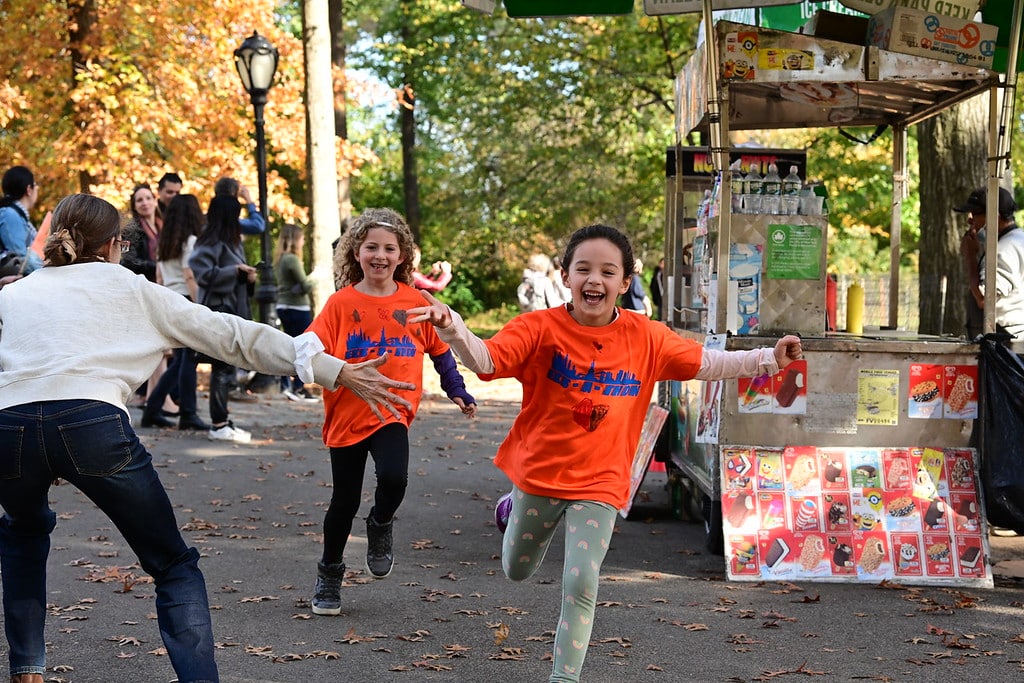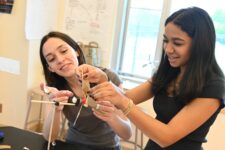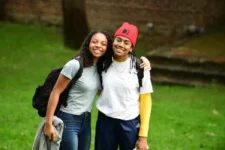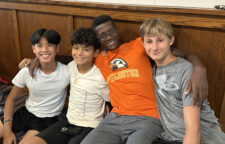In our community we strive to prioritize self-care and attentiveness to others. Our faculty and staff take on the role of caring mentors who support students’ physical, social, and emotional well being. To ensure that our students are learning, we must first ensure that they are healthy.
Research consistently demonstrates that children who are happy and who feel included in their community learn more effectively, so we introduce a foundation of social-emotional learning at an early age. Across both lower divisions, teachers facilitate open sessions in which students anonymously share their anxieties with the class and their peers respond, empathizing and offering solutions. Many teachers also implement a “humble thumbs” policy: instead of raising their hands, students signal their understanding of a subject by flashing a thumbs-up at desk level — a discreet gesture that allows teachers to gauge overall comprehension without giving rise to competition or embarrassment.
Along with our commitment to social-emotional wellness, we embrace differentiated instruction and various approaches to learning. One of the first assignments Fieldston Lower students are assigned is “homework homework” — making weekly schedules to track busy days, to identify difficult subject areas, and to reflect on preferred work settings, whether alone or with others, at home, or somewhere else. In a visit to our lower divisions, one might find students wearing noise-canceling headphones to focus on their work or sitting with a small group of classmates in the hallway to collaborate on a project. All of this is intentional and encouraged.
Fieldston Outdoors is a six-week summer day camp that allows lower school students to engage with nature. A day might include a hike through the Palisades or a canoe ride down the Piermont Marsh.
Even as our students progress into Fieldston Upper, we maintain our focus on ensuring that they take care of themselves. The narrative across the country is that the pressure of standardized tests and college admissions has created an unprecedented amount of stress for high school students, and particularly for 11th and 12th Graders. At ECFS, our College Office tries to mitigate that stress by making the application process student-centered and driven by fit. The first question our counselors consider is not how selective a school is, but whether the geography, size, program, and environment match what the student desires. Almost all college-related meetings are conducted face-to-face and one-on-one so that students feel comfortable opening up about questions they may be embarrassed to share with their peers.
The mind, of course, operates as part of the body, so a commitment to ensuring our students are healthy socially and emotionally is a commitment to keeping their bodies healthy as well. Our lunch features daily vegan and gluten-free options, including a full salad bar; meals can also be customized to accommodate specific dietary restrictions. Students in all divisions are required to take physical education or an equivalent substitute, such as a sport or dance. Meanwhile, extracurricular athletic options abound. On the court and the field, our Fieldston Eagles thrive and routinely distinguish themselves.
There’s an inherently social aspect to healthiness that we also aim to tap into. Through our Student-to-Student (STS) program, Fieldston Middle mentees are paired with Fieldston Upper mentors, who coach them twice a week on ethical issues. The program builds a positive social framework for everyone: younger students have peers to look up to as role models, and older students take on the responsibility of student teachers.
In all our work, we are mindful that healthiness is contingent on self-care, self-respect, and a sense of belonging. Not only do we embrace diversity among our students and faculty, but we also build classes and workshops that give voice to marginalized communities. A two-day exploration of the successes and failures of the beauty industry in addressing the needs of women of color, for example, may offer Fieldston Upper students the chance to dismantle white-dominant beauty standards. “History of Sexualities in America,” an interdisciplinary seminar that traces the evolution of views toward sex, gender, and sexuality from colonial times to the present, reminds our students that the narratives of women and LGBTQ people are worthy of examination, discussion, and celebration.
The health of our students is foremost in our minds. We work diligently to ensure a safe physical environment, to attend to social and emotional health, and to offer a robust athletic program and wholesome dining options as well as abundant support networks. Students regularly practice habits that foster self-care and that help them become better learners, friends, and partners.



